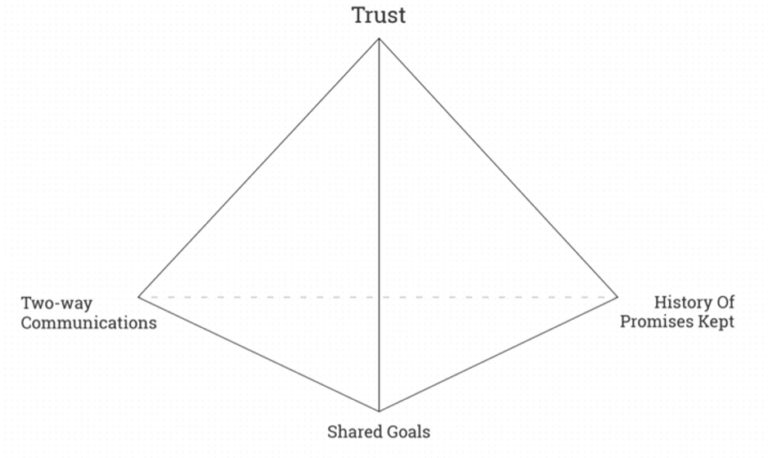With trust becoming a more visible issue during WFH for our clients, we thought it worthwhile to explore how trust has impacted contact centres and how practical tools and methods can build trust, providing a lasting difference for contact centre performance when they return to work.
Technology for WFH call centres has been available in Australia for a long time but the take up has not been well supported. This is because the challenge is not technology but, in many environments, trust. Trust is a key enabler to employee engagement and change required with WFH and in other service continuity situations.
The antidote to the ambiguity that Covid-19 has delivered is not going to be certainty (for a long while anyway), and in light of this ongoing uncertainty companies will need to focus on building out new leadership capabilities and support systems that encourage and reinforce trust.
This simple pyramid sums up how to design systems of trust. If any of the elements are missing, the pyramid fails.

To continue to support WFH agents, companies should consider training leaders and managers to develop new leadership capabilities (behaviours and mind-sets) and adapt support structures (e.g. developing new shift times, OH&S policies, technology, learning and development, team engagement and productivity measurement systems) that develop and reinforce trust.
If they are to be successful, companies with home-based agents should consider spending a portion of their day engaged in activities that build trust. If you are looking to extend or expand your current WFH agent numbers, here are some questions you should ask yourself:
Shared Goals
- Are your agents managed to objectives?
- How aligned are your goals with your agents?
- Do leaders in your organisation see home-based agents as a part of the overall service strategy rather than just an experiment?
- Have you adjusted your performance measures to output? (deliverables rather than input/hours worked)
- Are your managers doing 1:1’s, asking questions, understanding motives and checking in?
- Do you have systems in place to ensure home-based workers are given appropriate time and have access to the right systems for training, learning and development?
- Are there systems in place to give people the opportunity to explore new ideas, seek feedback, review and reflect on action together?
Two Way Communications
- Do you have systems (meetings, 1:1’s etc.) in place that support ongoing dialogue with your agents and other key stakeholders? Do you involve influential leaders in these discussions so they are visible?
- If asked would they consider this dialogue two-way? Have your managers adapted their behaviours and style to allow for people to feel safe to speak up in a virtual environment?
- If there is business uncertainty has your leadership team provided a clear interim direction?
- Do you have systems to connect home-based agents to the rest of the team (e.g. fortnightly office days or bringing home-based workers together once per month for training)?
History of Promises kept
- What actions have you committed to as an organisation and in what timeframe?
- Have you made adjustments to cater for home-based work (things like tech support, office equipment, technology stipends etc.)
- Are you providing WFH agents with regular updates and communicating when commitments are filled?
Companies that have taken the leap indicate that there could be an opportunity for significant upside to creating a ‘new normal’ when it comes to WFH agents. Companies such as Medibank, MYOB, AAMI, and AMP report increases in productivity, increased employee engagement and lower turnover.
Who knows, this might actually be a once in a lifetime opportunity to come out of Covid-19 with a more engaged, productive and passionate agent workforce. We know trust leads to productivity increases, employee engagement/retention and greater levels of client satisfaction/retention.
Using a trust lens to review future change, transformation or contingency management or review the past performance of Covid-19 initiatives will assist organisations to integrate trust practices that will enable future success. This exposes gaps in current practices that can be addressed creating practical activities with rapid & measurable performance improvement against the business objectives.
While trust is often exposed during WFH as managers and leaders grapple with not having staff visible, trust is equally important for working in the office. Any work done to improve trust in todays environment will support longer term success of the team.
While trust is best thought of as a key enabler it is also not a golden bullet solution. Having deep operational and HR experience is needed to translate trust gaps into action and integrate the trust tools into the business to ensure they deliver practical performance improvements.
For anyone looking to rollout or scale their WFH contact centres we have developed the following tools to help:
- WFH performance framework assessment to optimise WFH operations
- Reporting and governance for WFH
- Diagnostic tools for understanding your challenges to setting up a WFH contact centre
- Leadership training for setting up successful WFH systems
- Trust and Change Review to build a Recommended Action Plan that will optimise performance
- Data Security, Privacy and Work Health & Safety Rapid Assessment
- Rapid Response Contact Centre Service
- Rapid Response technology platform with knowledge as a service, skill verifying and optimising use so we know the customer is getting accurate and consistent answers
- Contingency planning
To support our clients and you, we have a CX Consulting and Professional Services capability that is able to assist further. We have specialists in change and employee engagement that are using the trust paradigm and tools today across multiple clients. So, if you need help we will bring cross industry experience to support your CX vision.
We would be delighted to share our experiences to support your practices during WFH and returning to work. Contact us or call us on (02) 9160 7760 to find out more.
